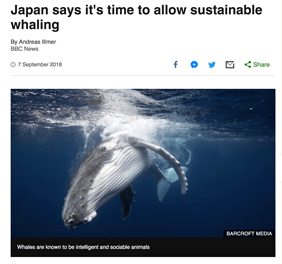
Figure 1. News Article on BBC
Article: Japan says it’s time to allow sustainable whaling – BBC
https://www.bbc.com/news/world-asia-45364696
This article discusses the issue of whaling, specifically Japan’s recent proposal to end the ban on commercial whaling. Japan is one of the few nations, along with Iceland and Norway, who have historically hunted whales and dolphins for centuries. In 1986, the International Whaling Commission (IWC) declared a moratorium on whaling to allow whale stocks to recover. Most international bodies agreed upon this, including Japan, but the temporary ban was prolonged and normalised into a permanent ban. Japan has since opposed the IWC’s moratorium and continued whaling under the clause of “research”. While it claims to be monitoring stock levels and the conservation status of whales, critics argue that these whales end up as food. Whale meat does indeed get sold in Japan, labelled as bycatch from research expeditions.
According to the article, Japan’s representative to the IWC proposed repealing the ban on commercial whaling and allowing sustainable whaling instead. Measures suggested to support this included formation of a Sustainable Whaling Committee and setting catch limits on abundant whale stocks. However, this proposal is opposed by anti-whaling nations such as Australia, who have continuously criticised Japanese whaling practices.
Whaling and hunting dolphins are often defended with appeals to Japanese tradition and culture. According to Prime Minister Shinzo Abe, “The dolphin hunting that takes place in Taiji town is an ancient practice rooted in their culture,”(Jackson, 2014). However, Japanese motivations for whaling are perceived to be largely economic, as whales caught are sold for their meat. As a result, Japan appears to be unconcerned about the conserving these whale stocks, a perception which is compounded by their claims of scientific research as a disguise to catch whales for meat.
There are few pro-whaling countries, and opposition countries such as Australia are pledging to oppose the Japanese proposal and maintain the ban on commercial whaling. Such activists make a moral argument against whaling, arguing that whales “face so many threats in our degraded oceans” and deserve to be protected. They also claim that whales are intelligent animals and methods of killing them with harpoons lead to slow and agonising deaths. Anti-whaling activists are thus portrayed to be more concerned about the conservation of whales from an ecological perspective, to protect the whales for its own sake, rather than the Japanese who seek sustainable resource of whales.

Figure 2. Photo of Japanese Whaling Ships from Sea Shepherd Conservation Society
On the other hand, the article also presents Japan’s arguments against opposition to their proposal. According to them, “opposition to sustainable whaling of non-endangered stocks is deeply hypocritical,” with a comparison to industrial meat production where farmed animals are raised for meat and kept in poor conditions. They also claim that hunting wild animals is more ethical than raising animals for slaughter. The Japanese whalers do not consider their practice to be more immoral or harmful than commercial animal farming.
Japan’s proposal in this article can be thought to be “green” to some extent. The Japanese proposals would allow for sustainable whale hunting and also make the establishment of new whale sanctuaries easier. It is worth knowing that the species of whales hunted by Japanese fishermen, the common minke whale, is not considered to be endangered unlike other species of whales (IWC, n.d.). Commercial whaling under these potential catch limits would likely limit Japan to a similar number of whales as are currently being caught under the proclaimed “scientific program”.

Figure 3. Whale Meat being sold on a popular online shopping platform, Rakuten
Despite these ideas of sustainability, it can still be seen that Japan’s priorities in its proposal lie in its goal of repealing the ban and being allowed to resume commercial whaling without facing opposition from other countries. Japanese claims of concern about the conservation and protection of whales are undermined by their continued hunting and killing of the same. Japanese whalers are reported to have killed 122 pregnant whales earlier this year, further evidence for their lack of concern for the preservation of whale stocks (BBC, 2018). This apparent disregard for the natural environment can perhaps be understood through Kalland and Asquith’s idea that the Japanese have a selective appreciation of nature, cherishing an idealized version rather than an original one. Rather than creatures to be appreciated and protected, their perception of these whales is that of a resource to be controlled and manipulated.
The article also reveals the conflicting views and perspectives of different communities within Japan by suggesting that the declining demand for whale meat in Japan may eventually lead to the dissolution of commercial whaling in the country. Most Japanese people do not consume whale meat and many are opposed to its whaling practices, despite the government’s continued efforts to promote whale consumption such as introducing it in school lunches. It can be seen that the perception of these animals and response to this issue is not homogenous throughout Japan, and this is, in fact, a polarizing issue.
(790 words)
References
International Whaling Commission. (1946). History and Purpose. Retrieved September 30, 2018 from https://iwc.int/history-and-purpose.
Jackson, P. (2014, January 26) Japan’s Abe Defends Dolphin Hunt. Retrieved September 30, 2018 from https://blogs.wsj.com/japanrealtime/2014/01/26/japans-abe-defends-dolphin-hunt/
Japanese whale hunters kill 122 pregnant minke. (2018, May 20). BBC News. Retrieved September 30, 2018 from https://www.bbc.com/news/world-asia-44307396
Kalland, A. and P. J. Asquith (1997). “Japanese perceptions of nature: ideals and illusions.” Japanese Images of Nature. P. J. Asquith and A. Kalland. Richmond, UK, Curzon.
Paterson, S. (2016, March 25) Japanese whaling: why the hunts go on. Retrieved September 27, 2018 from https://www.bbc.com/news/world-asia-35003272
Status of whales. (n.d.). Retrieved September 30, 2018 from https://iwc.int/status
Whale meat back on school lunch menus. (2010, September 05). The Japan Times. Retrieved September 30, 2018 from https://www.japantimes.co.jp/news/2010/09/05/national/whale-meat-back-on-school-lunch-menus/
Wingfield-Hayes, R. (2016, February 8) Japan and the whale. Retrieved September 27, 2018 from https://www.bbc.com/news/world-asia-35397749